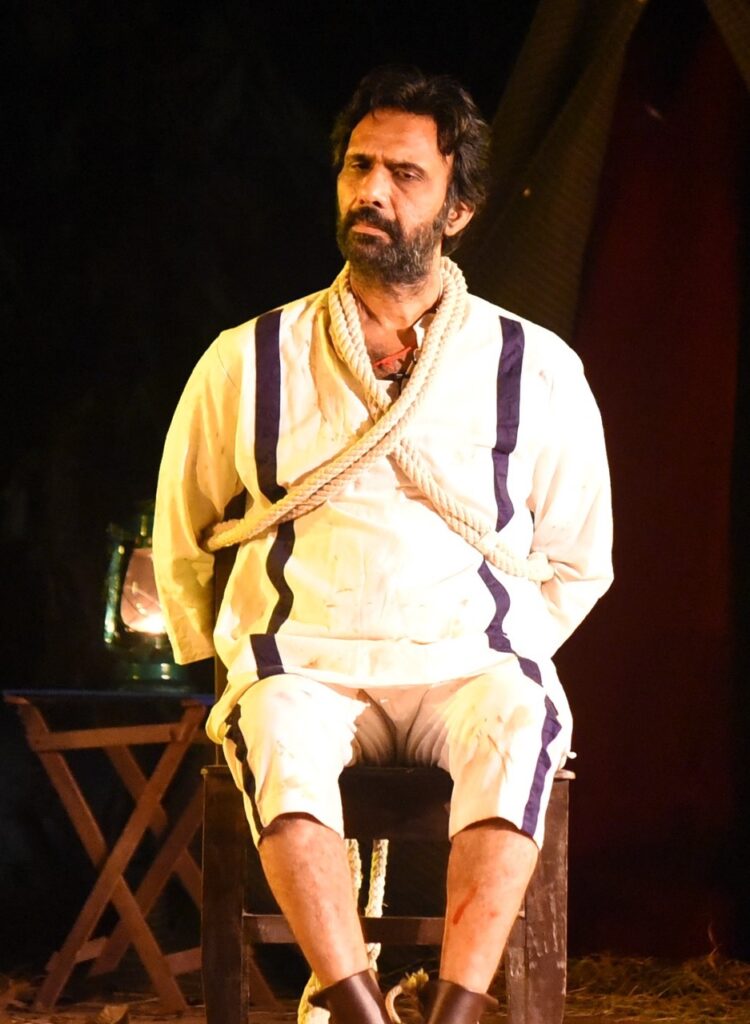
When the audience walked into the historic Taramati Baradari auditorium, they were in for an experience that took them beyond theatre, beyond any Indian play in the proscenium. That’s when one realizes why Mohammad Ali Baig’s play ‘1857 : Turrebaz Khan’, that had a distinction of a world premiere at the world’s most revered performing arts festival destination in Edinburgh and London had critics there raving about its philosophical writing and breathtaking presentation.
From its sets and stage design, sound track, lighting to performances, everything about this completely enveloping production was spell-binding. What riveted the full-house audience further to their seats at the historic Taramati Baradari auditorium for an hour is the word play between the revolutionary Rohilla jamedar of the British army and the Talukdar of Toopran. The two central characters on stage. The 19th century freedom fighter, brave heart Turrebaz Khan whose valour and bravery gave birth to the phrase ‘Turram Khan’ was a soldier extraordinaire with exemplary courage. He, alongwith his mentor Maulvi Allaudin, the Imam at Hyderabad’s iconic Mecca Masjid led an attack on the British Residency, the house of British Resident Col. Davidson (which now houses the Osmania University’s Womens College) in Koti to free his comrade Cheeda Khan, who was arrested and locked in the basement cell.

The imaginary conversation between the two highlights the global conflict of class discrimination of the privileged and under-privileged, of haves and have-nots. The dialogue by an unnamed woman character, dressed in all black, tells the agony on classical melody that turns into pathos with the percussion instrument Daff she plays. A masterful blending of metaphors by Baig. Enter a man, also dressed in all black with an Arabic Marfa before the mighty bass drum player, who leads in the area’s Talukdar, Qurban Ali (played by Masood Akhtar). Baig uses these different sounding drums to convey socio-gender disparity remarkably. His visual mounting of the whole story in a dense forest, artistic symbolism, authentic costume, plus his use of the large stage space sets him apart as one of the most prolific of theatre masters in theatre in the country and overseas. As a playwright, he questions you through the character of Qurban Ali, when Turrebaz asks him, “Who’s a traitor really ? The one who fights against discrimination or the one who play-caters to the system for his own benefits without caring for one’s motherland?”
From the director’s vision, to a playwright’s flair and a breath-taking performance, Mohammad Ali Baig leaves you with goose bumps, though tied to a chair in ropes throughout the hour-long performance. Mumbai theatre’s Masood Akhtar roars with his portrayal of the opportunist officer. Vasudev Rao with Sets and Shailesh Hejmady on lights completed the experience that make every Qadir Ali Baig Theatre Foundation a benchmark of finesse and nuanced craftsmanship.
Kudos to Baig for bringing a slice of Deccan’s history to life with a befitting heart-and-soul creation.
Another hallmark of a Baig production is the mix of audience that fill in the venue, driving all the way, even to remote venues to watch him.

Watching in rapt attention were Telangana Governor Jishnu Dev Varma, former Maharashtra Governor Ch. Vidyasagar, US Consul General Evans Williams, ex-Chief Secretaries Ajay Mishra and S K Joshi, Sania Mirza’s father Imran Mirza and the crème-de-la-crème of the twin-cities. The play produced by late Begum Razia Baig was staged by Qadir Ali Baig Theatre Foundation supported by Telangana Tourism and HMDA to celebrate India’s 79th Independence Day.
Befittingly, the play was accorded a world premiere at the revered Edinburgh Fest and a UK premiere in London.


